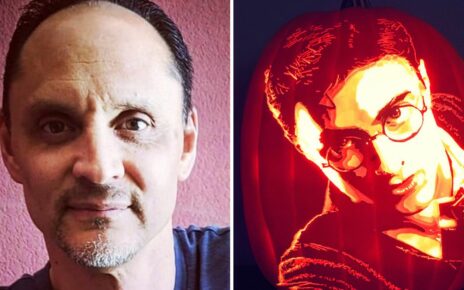A WOMAN says her organs are fused together like a "sticky cobweb" – which makes sex so agonising she hasn't slept with her partner in a year.
Laura Debney, 37, suffered painful periods from the age of 11 – but was consistently told it was "normal".
The pain spread until her whole body was being tortured "all the time" – and she was diagnosed with endometriosis aged 26.
The condition causes tissue similar to the lining of the womb to grow in other places, such as the ovaries and fallopian tubes, and bonds them. There is no cure.
Laura, a civil servant from Cardiff, had multiple surgeries to remove the tissue, but she said it would just grow back worse each time.
She can now only work for five hours a day because the pain becomes too much for her to focus, and she struggles to sleep at night.
READ MORE ON ENDOMETRIOSIS

I spend 3 weeks every month in intense pain – yet docs ignored me for years

Women plagued by endometriosis at higher risk of depression, docs warn
Laura also finds sex too painful and hasn't been able to be intimate with her partner of 10 years, Adam Hill, 43, in over a year.
She said: "When I first started my period, it would feel like someone had punched all the way through me to my back.
"I was told the pain was normal for girls, and I just 'wasn't used to it' – but eventually the pain was all over my body, all of the time.
"When I had surgeries after being diagnosed, the doctors found all my organs were bonded together.
Most read in Health

Drinking tea every day could slash diabetes risk – but it has to be brewed right

What is driving alarming surge in cancer cases striking the under-50s?

When is your cough a health danger? Dr Zoe Williams answers your questions

What the location of your headache means – and the best way to treat each pain
"They said it was like they were tangled up in a sticky cobweb.
"They tried to remove all the adhesions, but it just grew back again.
"As time has gone on, the pain has just become greater – and it's permanent.
"My boyfriend and I haven't had sex in over a year because I'm always in pain."
Laura would experience severe pain and bleed very heavily during her time of the month – often leaking onto her clothes.
But whenever she complained, she'd be told it was "normal" and she was "overreacting".
Laura struggled on, until an incident at work aged 23 made her realise her symptoms were a sign of something more serious.
She said: "I was lifting heavy files up and down some stairs while I was on my period and I was struggling.
"I felt like I was going to pass out – I bled through a tampon and a towel, and onto my clothes.
"I walked out and never came back."
My boyfriend and I haven't had sex in over a year because I'm always in pain.
It took years to get an appointment with a gynaecologist, and Laura quit all her much-loved active hobbies such as hiking and airsoft (a survival-based airgun shooting game) – because they caused her too much pain.
Following a procedure called a laparoscopy in 2013, she was finally diagnosed with a severe case of endometriosis.
Laura had all the adhesive tissue removed in two different operations the same year, but her symptoms started to return two years later.
She learned the organs had already bonded together again in 2015 – and doctors repeated the surgery to remove the adhesions again.
When she began to notice her condition worsening yet again, she had to pay privately for another procedure in 2019 which revealed the adhesions had spread beyond her reproductive system to her bowels.
This meant even a full hysterectomy (removal of the womb) wouldn't fix her problems – and the doctors were out of options.
Since then, Laura has been prescribed progressively stronger medication to help her live a normal life despite chronic pain.
But due to limits on how much she can take in a day, she still finds the condition "debilitating" and has been forced to reduce her hours at work.
She said: "I don't meet the criteria for disability benefits, so financially I'm in a lot of debt at the moment."
She is woken up in the night due to pain, and has to decline seeing friends if it means too much movement while travelling, which could cause agony.
Laura used to have a good sex life with Adam, an office manager, but now finds penetration too painful.
She said: "At the beginning of the relationship, I could make the best of it, but as it got worse, I had to be honest about the pain I am in.
"Now he knows, he finds it difficult because he doesn't want to cause me pain – but I do miss sex.
"Sometimes when I've got some antibiotics with me we can plan to do it, but we can never be spontaneous, so it feels like a chore.
"Whenever we do have sex, I end up bleeding and with a UTI."
Laura hopes greater awareness of the condition will lead to further research – and a treatment, if not a cure.
She added: "I'm sure a lot more women have it than we know about.
"Like me, they were probably told to 'stop being ridiculous' because 'we all have pain.'
"People don't see the reality of the condition, and it is so grim."
Adam added: "These past couple of months have been really bad for Laura.
"I wish I could experience the pain so I could relate to it and I'd know how to help her.
Read More on The Sun

Escaped pet skunk 'fully loaded' with stink spray, owner warns

My devastated daughter was ordered to take off dead dad's bracelet at school
"I just try to look after her as best as possible – whether that's running her a bath, cooking her meals or filling the hot water bottle.
"It's awful to watch her suffer but I've learnt how to adapt and I've done a lot of reading into it myself to better understand what she's going through."
What is endometriosis?
ENDOMETRIOSIS is a condition where tissue similar to the lining of the womb grows in other places, such as the ovaries and fallopian tubes.
One in 10 women have it, including Molly-Mae Hague and Baby Spice Emma Bunton, and it can affect people of any age.
The main symptoms include stomach and back pain, pain after sex, pain when going to the toilet during your period and feeling sick.
It can be difficult to diagnose, but tummy and vagina examinations are common, as well as ultrasound and MRI scans.
A laparoscopy, where a surgeon passes a thin tube through a small cut in your tummy, is the only way to be certain you have endometriosis.
There is no cure, but treatments include painkillers, hormone medicines and contraceptives, and surgery.
Source: NHS
Source: Read Full Article






